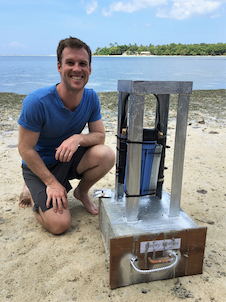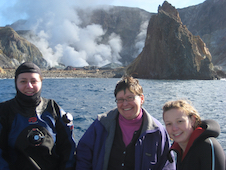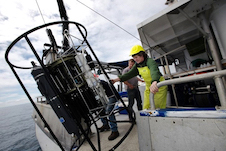Deployable environmental sensors

Postgraduate Wayne Dillon with sensor equipment.
The research group headed by Dr Christina McGraw in the Department of Chemistry, University of Otago (New Zealand) focuses on designing potentiometric and spectroscopic analytical methodology to study fine-scale spatial and temporal changes for a broad range of environmental and marine chemistry parameters.
Recent postgraduate projects within her group have involved the development of an optical fibre-based microsensor for in situ measurements of pH in biological boundary layers, a system for deterring biofouling of marine sensors, a flow-through gas phase system for dimethyl sulfide (DMS) measurements, and an autonomous deployable sensor system sensitive to the CaCO3 saturation state (Ω).
The group also endeavours to improve the computational methods and fundamental thermodynamic equilibrium constants underpinning marine carbonate system characterisation.
Dr McGraw's research, in collaboration with national and international organisations, strives to improve OA monitoring capacities and capabilities, thereby enhancing our ability to mitigate the impacts of global climate change on marine calcifying species in future ocean conditions.
People to contact:
Dr Christina McGraw
Ecological statistics and modelling
How does incidental mortality from fisheries affect seabird populations? What will happen to our oceans under a changing planet?
We need ecologists, chemists, geologists, statisticians, and many other specialists to use their combined knowledge to start answering these important questions.
Dr Peter Dillingham develops and applies statistical methods to help answer these types of questions, whether that's using population modelling to estimate fisheries impacts or designing experiments to better understand the biological impact of our changing ocean.
People to contact:
Dr Peter Dillingham
Mineralogy of marine biogenic carbonates
 From left: Joanna Brinkman, Professor Abby Smith and Astrid Lorange at Whakaare White Island, where CO2 seeps create the seawater of the future.
From left: Joanna Brinkman, Professor Abby Smith and Astrid Lorange at Whakaare White Island, where CO2 seeps create the seawater of the future.
The research group headed by Professor Abby Smith in the Department of Marine Science, University of Otago (New Zealand) focuses on biominerals, biomineralization, and the biological controls on mineral precipitation.
The main research focus of her group involves determining the effects of skeletal composition on resilience to changing sea-water chemistry in marine invertebrates. We have looked at how different water chemistries affect skeletal composition, as well as environment, phylogeny, and ontogeny. Growth, mineralogy, preservation and mineralisation strategies of marine bryozoans is a particular emphasis.
The group also studies effects of sample cleaning, storage, preservation and preparation on skeletal geochemistry measurements.
Understanding the controls on biomineralization in marine calcifying species helps us to predict their fate in future ocean conditions.
People to contact:
Professor Abby Smith
Munida Time Series transect
 Ocean launching of Munida time series equipment. Photo: Dave Allen (NIWA).
Ocean launching of Munida time series equipment. Photo: Dave Allen (NIWA).
The Munida Time Series was established in 1998 by NIWA, in collaboration with the University of Otago, to investigate the dynamics of the marine carbon cycle in the waters off the Otago coast. The surface transect extends 65 km off the south east coast of New Zealand, and includes neritic, modified subtropical and sub-Antarctic surface waters (SASW).
Core measurements of pCO2, pH, alkalinity and DIC are made every two months by marine scientist and principal investigator Kim Currie. This long-term dataset allows us to study the changes in atmospheric carbon dioxide uptake and hence investigate the long-term spatial and temporal changes of the ocean carbonate chemistry. In addition, short term research projects that can range from one day up to six years are studied alongside this main program.
Among others, these projects have focused on investigating zooplankton and phytoplankton trophic interactions, phytoplankton and bacterial community structure and dynamics, bacterial production, seabird observations, trace metal chemistry, carbon dioxide modelling, and characterization of the physical oceanography.
People to contact:
Dr Kim Currie
Malcom Reid
Related links:
Visit METABASE Explorer to view Munida time series data
Munida Microbial Observatory Time-Series website
Phytoplankton physiology and ecology
Associate Professor Linn Hoffmann is a biological oceanographer in the Botany Department, University of Otago (New Zealand), with a focus on marine phytoplankton eco-physiology. Her research group mainly works on the response of phytoplankton communities to multiple environmental and climate change stressors such as ocean acidification, light, temperature, macronutrient concentration, microplastics, and trace metal bioavailability. These research topics are supported through the close interaction of Dr Hoffmann's group with researchers from multiple disciplines such as chemistry, geology, and geochemistry, and ecology.
Associate Professor Hoffmann also has a special interest in the effect of metal release from volcanic eruptions for the marine primary producers and the related effects on higher trophic levels.
Recent postgraduate research projects have concentrated on phytoplankton – bacteria interactions, the impact of microplastics on marine algae and the impact of climate change stressors on marine mixoplankton.
People to contact:
Associate Professor Linn Hoffmann
